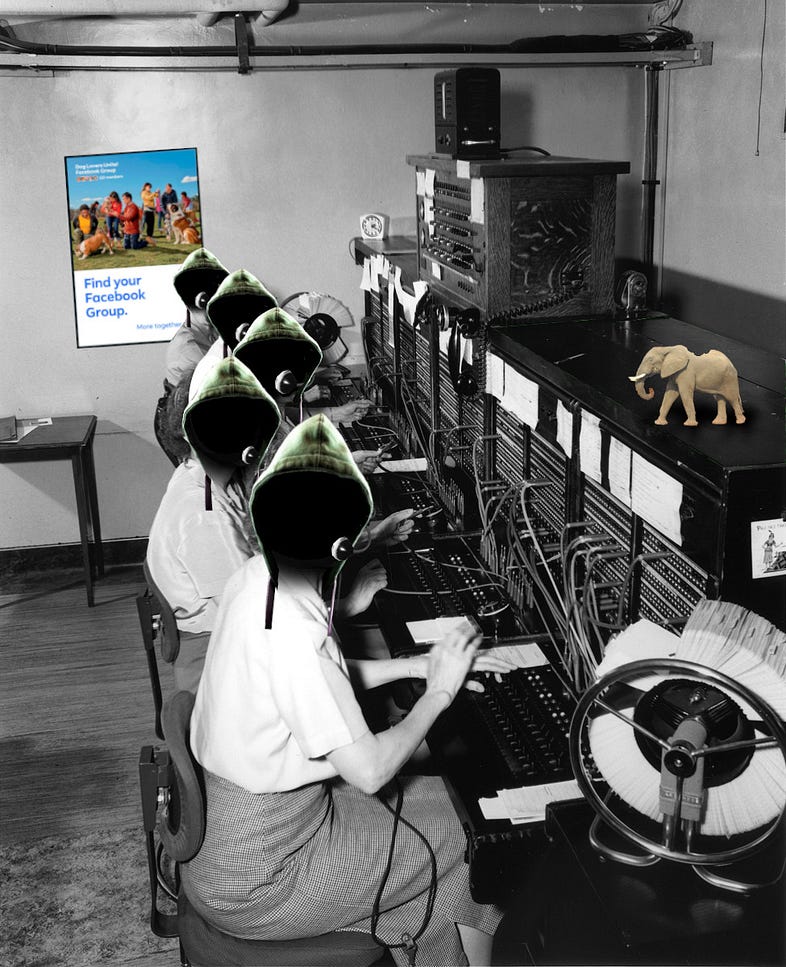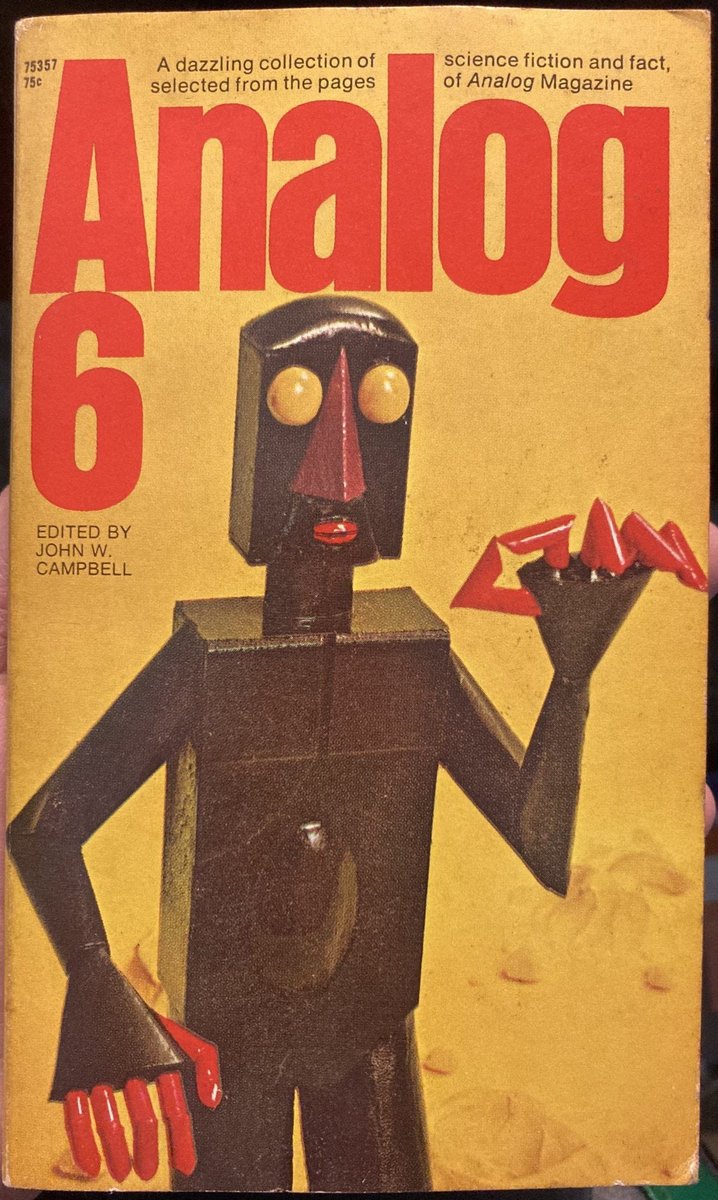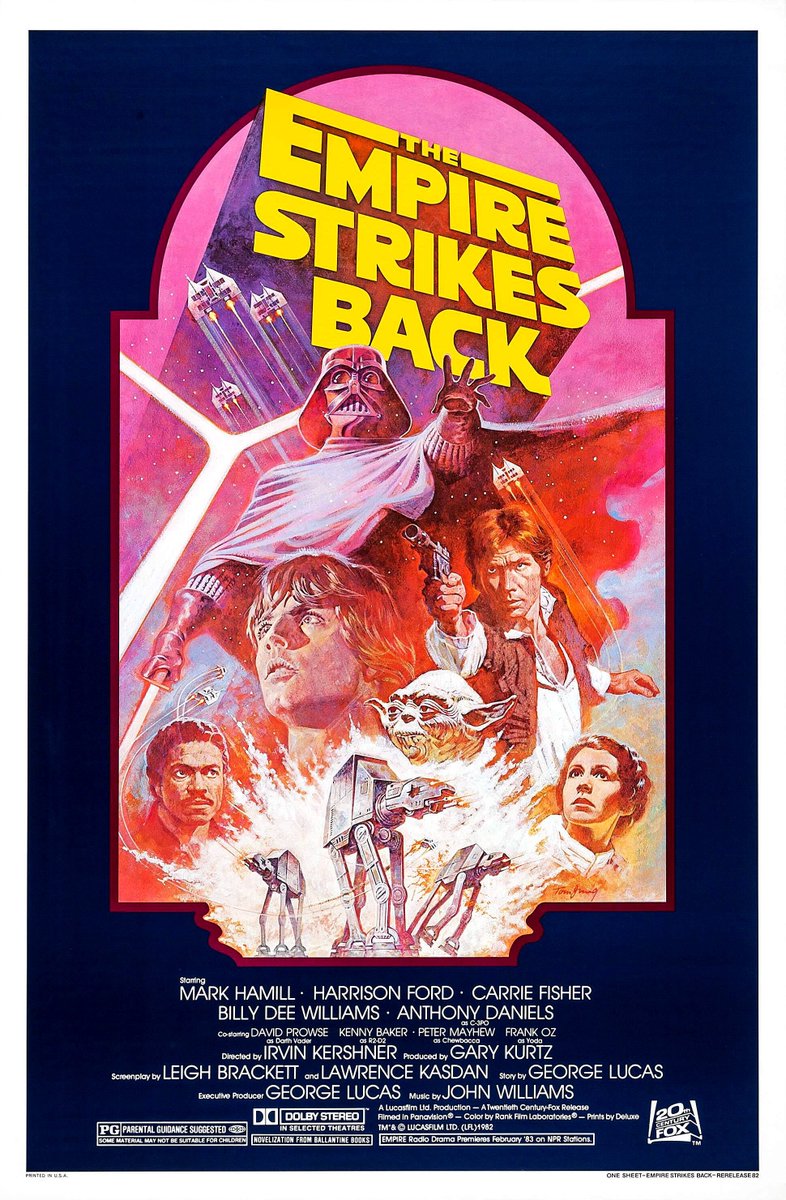
"End to End," is my new column for @LocusMag, proposing a policy for a better internet: the "#EndToEnd" principle (#E2E), a bedrock of the original design for the internet, updated for the modern, monopolized web, as a way of #disenshittifying it:
locusmag.com/2023/03/commen… 1/
locusmag.com/2023/03/commen… 1/

If you'd like an essay-formatted version of this thread to read or share, here's a link to it on pluralistic.net, my surveillance-free, ad-free, tracker-free blog:
pluralistic.net/2023/03/07/dis… 2/
pluralistic.net/2023/03/07/dis… 2/
The original E2E marked the turning point from telco-based systems where power was gathered at the center, controlled by carriers, to the packet-switched internet, where power moved to the edges. Under the old model, only the network operator could add new features. 3/
If you wanted to create, say, Caller ID, you needed to convince the phone company to update its switches to support a new signaling system (and you probably had to rent a Caller ID box from the carrier, too). 4/
But packet-switching made it possible for new services to be created by people at the edges of the network. Once your device was connected to the internet, it could exchange data with any other device on the internet. 5/
If someone set up a voice-calling system and you connected to it, they could add Caller ID to it without asking Ma Bell for permission. 6/
End to end was the core ethic of this system: the idea that the telcos that sat beneath these systems should get out of the way of their users, serving only to deliver data from willing senders to willing receivers as quickly, efficiently and reliably as possible. 7/
E2E was a powerful idea, one that truly treated the telcos as utilities - the plumbing that sat beneath the services, obliged to serve its subscribers by doing their bidding to the extent they could. 8/
If you chose to use a internet calling service instead of making phone calls, the carrier's job was to shuttle those packets around, not to slow them down or block them to funnel you into its rival service. 9/
There's a powerful logic to this: no one rents a phone line because they want to make sure that the carrier's shareholders are getting the highest possible return on their investment. The reason we buy network connections is to get to the services we value. 10/
We have no duty to arrange our affairs to the benefit of a carrier's shareholders. If those shareholders are so emotionally fragile they can't bear the thought of users making their own choices on which services to use, they should get into a different line of work. 11/
E2E wasn't a *law*, it was a *principle*. Principles are useful! They can be embedded in laws (for example, the laws that establish most network providers as #CommonCarriers often include an E2E rule). 12/
But just as importantly, they can give us a vocabulary for critiquing or designing services: "Ugh, I won't use that service, it's not end to end," or "How can we make this work in an end to end way?" 13/
Principles can be integrated into professional codes of ethics, or procurement rules for public bodies ("Our university only buys end to end services"). Tech groups and publications can use principles to rank competing technologies ("Which network providers are end to end?"). 14/
#NetworkNeutrality is a way of operationalizing E2E: the idea of #NetNeutrality is that carriers should be obliged to treat all traffic the same. 15/
If you request Youtube packets from Comcast, Comcast should deliver those packets as quickly and reliably as it can, even though its parent company, Universal, owns several competing services. 16/
Net Neutrality can be treated as a principle ("This ISP sucks - it violates Net Neutrality") or as a regulation ("The @FCC is fining your ISP because it violated Net Neutrality"). 17/
As a regulation, Net Neutrality has a problem: it's hard to administer, because it's very difficult to detect Net Neutrality violations. 18/
The internet is a "best effort" network, with no service guarantees, so when your Youtube connection starts to jitter, it's hard to prove that this is because Comcast is screwing with it, as opposed to regular network congestion. 19/
Which brings me to my E2E proposal: end to end for *services*. Contemporary services have *no* E2E. 20/
If you search for a product on #Amazon, Amazon often won't show you that product until you've looked at five screens' worth of other products that have paid Amazon to interrupt your search:
pluralistic.net/2022/11/28/ens… 21/
pluralistic.net/2022/11/28/ens… 21/
If you hoist an email out of Gmail's spam folder and add the sender to your address book, Gmail will still send that message to spam, or even block its server. 22/
It's incredible that we had a Congressional debate about whether Gmail should mark politicians *unsolicited fundraising emails* as spam but not whether emails from your reps that you asked to receive should be delivered:
doctorow.medium.com/dead-letters-7… 23/
doctorow.medium.com/dead-letters-7… 23/
Platform creators are workers whose boss is an algorithm that docks every paycheck to punish them for breaking rules they aren't allowed to know about, because if the boss told you the rules, you'd learn how to violate them without him being able to punish you for it. 24/
Again, it's wild that we're arguing about "#shadowbanning" (a service choosing not to send your work to people who didn't ask to see it), ignoring the fact that platforms won't deliver your posts to people who explicitly subscribed to your feed:
pluralistic.net/2023/01/21/pot… 25/
pluralistic.net/2023/01/21/pot… 25/
Alexander Graham Bell's first telephone operators were young boys who entertained themselves by deliberately misconnecting calls, putting you in contact with people you never asked to talk to and refusing to connect you with the people you were trying to converse with. 26/
As @BruceS wrote in *The Hacker Crackdown*:
> The boys were openly rude to customers. They talked back to subscribers, saucing off, uttering facetious remarks, and generally giving lip. The rascals took Saint Patrick’s Day off without permission. 27/
> The boys were openly rude to customers. They talked back to subscribers, saucing off, uttering facetious remarks, and generally giving lip. The rascals took Saint Patrick’s Day off without permission. 27/
> And worst of all they played clever tricks with the switchboard plugs: disconnecting calls, crossing lines so that customers found themselves talking to strangers, and so forth.
mit.edu/hacker/hacker.… 28/
mit.edu/hacker/hacker.… 28/
Bell fired those kids. Even the original telecoms monopolist understood that the point of a telephone network was to connect willing speakers with willing listeners. 29/
Today's tech barons are much more interested in charging other people to interrupt your consensual communications with nonconsensual and often irrelevant nonsense and ads. 30/
This is part of the #enshittification cycle: first, the platforms lock you in by giving you a good deal, including feeds that contain the things you ask to see and search boxes that return the thing you're looking for. 31/
Then, platforms take away your surplus and give it to business customers. They spy on you and use the data to help target you on behalf of advertisers, whom they charge low rates for ads that are reliably delivered. 32/
They insert performers' and media companies' posts into your feed, generating traffic funnels that result in clicks to off-platform sites. They offer low fees and even subsidies to platform sellers and creators who produce #DRM media, like #ebooks and #audiobooks. 33/
Users get locked into the platform - by the collective action problem of convincing their friends to leave, by the collapse of local retail that can't match the investor-funded subsidies of would-be monopolists. 34/
They get locked in by DRM that they are legally prohibited from removing, causing them to lose their investment if they quit the service. 35/
Business customers also get locked to the platform: platform sellers have to sell where the buyers are; publishers and creators have to provide media where the audiences are; advertisers have to run ads on the services they've optimized for. 36/
Once everyone is locked in, the platform can fully #enshittify, harvesting surpluses from users and business customers for themselves. 37/
Platforms can hike fees, charge media companies and creators to reach their own subscribers, block posts with links off-site, insert ads into media (like #Audible is doing with paid audiobooks!), and so on. 38/
This is the cycle that E2E seeks to interrupt. E2E for services would dictate that platforms should connect willing speakers and willing listeners. 39/
The best match for your search should be at the top of the results - even if someone is willing to pay more to put a worse match there. Emails should be delivered to people you've told your provider you want to correspond with - not sent to a spam folder or blocked. 40/
As with the original E2E, there's lots of ways we can use this principle. It can simply be a term for criticizing platforms ("You aren't sending my posts to the people who follow me - that's a violation of the end to end principle!"). 41/
It can be a law ("It is a deceptive and unfair practice for ecommerce companies to deliberately return search results that are not the best match they can locate for the users' query"). 42/
It can be a punishment ("The FTC settled with Google today and ordered the company to implement a Gmail feature that permits users to identify senders whose messages will never be blocked or sent to spam"). 43/
Lots of people are pissed off about Big Tech and many have proposed that we could make it better by treating platforms as "utilities." But I don't want President DeSantis to run my email provider, or to decide what's too "woke" for me to see (or post) on social media. 44/
An E2E rule, on the other hand, creates a role for government that doesn't determine who gets to speak or what they get to say - rather, it ensures that when people speak and to others who want to hear them, the message gets through. 45/
Unlike Net Neutrality, E2E is easy to administer. If I claim your emails are being sent to spam after I marked you as a trusted sender, we don't have to do a forensic investigation of Gmail's servers. You just send me an email we observe where it lands. 46/
Likewise for search: if I search Amazon for a specific product or model number, it's easy to tell whether that product is at the top of the search results or not. 47/
Same goes for delivery to subscribers: if we suspect that Twitter is shadowbanning posters - say, for including their Mastodon addresses in their bios, or linking to posts on Mastodon - we just send some test messages and see whether they are delivered. 48/
Beyond #administratability, E2E has another advantage: cheap #compliance. Lots of the rules we've created or proposed for service providers are incredibly complex and expensive to comply with. 49/
Take rules about "lawful but awful" content, which require platforms to somehow determine whether a message constitutes harassment and block it if it does. 50/
These rules require an army of expensive human moderators or an expensive machine learning system, or both - so they guarantee that Big Tech will rule the internet forever, since no one else can afford to launch a new service with better community norms and better practices. 51/
By contrast, E2E is cheap to comply with. Trusted-sender lists for email providers, search engines that put best results first, and content algorithms that show you things you asked to see in the order that they were posted are all solved problems:
theatlantic.com/ideas/archive/… 52/
theatlantic.com/ideas/archive/… 52/
This isn't to say that platforms wouldn't be allowed to offer algorithmic feeds and results. Think of how @Tumblr does it: you can choose between a feed called "Following" (posts from people you follow) or "For You" (posts that Tumblr thinks you'll enjoy). 53/ 

Forcing platforms to clearly label their recommendations and give you the choice of controlling your own feed is a powerful check against enshittification. 54/
If you know when you're in charge and when the platform is driving things, and if you can toggle away from platform-determined feeds to ones that you design, the platform has to be *better* than you at choosing what you see, or you won't choose its recommendations. 55/
Platform owners have hijacked the idea that "freedom of speech isn't freedom of reach" to justify the now-ubiquitous practice of overriding users' decisions about what they want to see:
pluralistic.net/2022/12/10/e2e… 56/
pluralistic.net/2022/12/10/e2e… 56/
The Old Internet had lots to going for it. It wasn't perfect, though. While it was easy to find the things you knew you liked, it could be hard to find things you *didn't* know you liked. 57/
Recommendations, whether they come from an algorithm or a human editor, are a source of endless delights. But when a we find something we like through one of those recommendations, we need to know that we can find more from that source if we choose to. 58/
Sometimes it's nice to scroll an algorithmic feed and get a string of surprises. But we are *forced* to use those feeds, they will inevitably enshittify, to our detriment, and to the detriment of the people who make the things that please us. 59/
As ever, the important thing about a technology isn't what it does, it's who it does it *for* and who it does it *to*. When we control our feeds, we can choose to let a recommender system do the driving. If we're locked into a recommendation system, it drives *us*. 60/
Image:
Felix Andrews (modified)
commons.wikimedia.org/wiki/File:Elep…
CC BY-SA 3.0
creativecommons.org/licenses/by-sa… 61/
Felix Andrews (modified)
commons.wikimedia.org/wiki/File:Elep…
CC BY-SA 3.0
creativecommons.org/licenses/by-sa… 61/
• • •
Missing some Tweet in this thread? You can try to
force a refresh
















